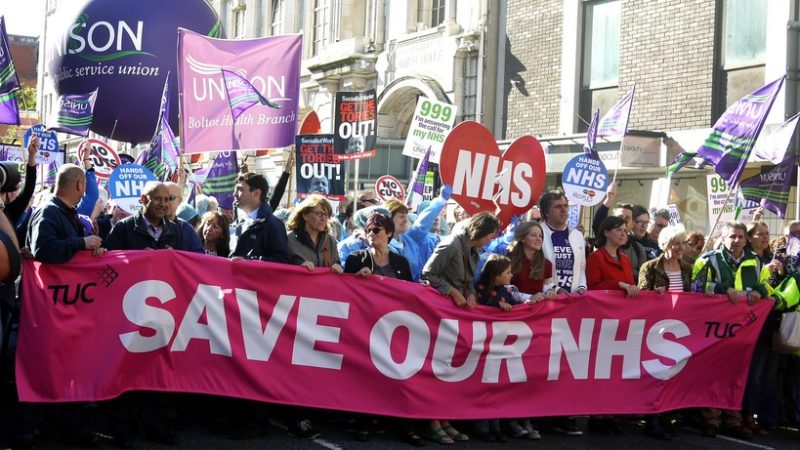Outsourcing jobs to private companies will create a more fractured and less responsive health service.

A petition against NHS privatisation has reached over 150,000 signatures in just four days whilst protests and strikes continue to build locally. Those looking out for patients and staff in the NHS aren’t going down without a fight, says Unison organiser Fred Jerrome.
The current battle revolves around NHS jobs being outsourced to subsidiary companies (or “subcos”) by a number of hospital trusts around the country.
It’s a plan that will alienate health workers and has nothing to do with looking after people, cooked up by hospital managers who think they know better than their workforce.
Some health trusts claim they can pay less VAT by having a subco do the work. Others say a subco will be more flexible. But as trade unions have explained, this doesn’t stack up.
The VAT loophole is unproven, dependent on an old Government directive, and likely to be shut if more Trusts take advantage of it.
Worse, reducing a VAT payment doesn’t create any new money. It’s an accountancy trick moving money between Trusts and the Treasury.
The only flexibility subcos provide is the flexibility to reduce pay and conditions. Staff won’t have access to NHS pensions, meaning they lose out in retirement.
Let’s not forget that the relevant groups of workers in estates and facilities often do the most physical and lowest paid jobs.
The evidence for the best care points to joined-up health services helping patients get the right care at the right time. Yet subsidiary companies would put up a wall between the person who cooks a patient’s meal and the person who takes it to them.
It’s not only unions who are concerned. In Somerset, where Yeovil Hospital has outsourced 350 staff to a subco, the local clinical commissioning group (CCG) have called for a pause because of the problems it creates for future collaboration.
Subcos look different from Bolton to Bath, but one theme is clear: management are determined to plough on regardless of the facts.
We’ve seen Yeovil District Hospital shut unions out of meetings and refuse to share details until the subco decision had already been made. All this in spite of over a third of their staff signing a petition against the subco.
In Gloucestershire, where 900 staff backed a petition to stop it, the business case for the subco is still a secret and the Trust chief exec has gone on video attacking trade unions.
Indicative ballots in Airedale, Harrogate and Wigan have all shown majorities of NHS staff saying they’d take industrial action over the subcos. More ballots may happen across the country.
Withheld documents. Closed meetings. Token consultation. Subcos are raising the question of how little scrutiny a health trust can get away with.
Though in Yeovil they got their subco through, in Bristol, the Trust backed down in the face of resistance.
The Trust boards we are dealing with in the South West are not interested in what their workers think.
They treat trade unions as intruders. Their subcos would break up the national collective bargaining that has been one of the few things holding the NHS together since the 2012 reorganisation.
The NHS is a jewel in so many ways. Not least, its attempt at true partnership between workers and management. The arrogance of Trust directors in Gloucestershire, Yeovil, Yorkshire and elsewhere is to drive a coach and horses through this and think they will get no pushback from staff.
The NHS runs on its porters, its domestics, caterers, cleaners and gardeners. Chief execs would do well to listen to them and scrap their subco plans before it’s too late.
Fred Jerrome is an organiser for UNISON. Follow him on Twitter.
To reach hundreds of thousands of new readers we need to grow our donor base substantially.
That's why in 2024, we are seeking to generate 150 additional regular donors to support Left Foot Forward's work.
We still need another 117 people to donate to hit the target. You can help. Donate today.



